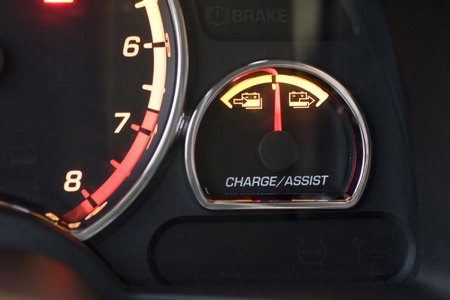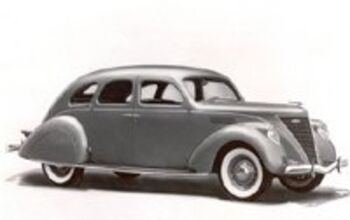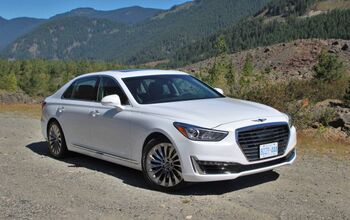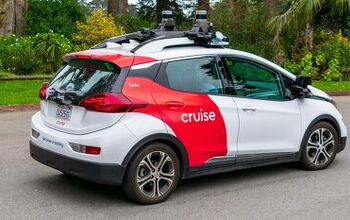A Federal Bailout by Any Other Name…
A hypnotherapist once told me that he began every session by asking his subject to close the door, hand him a pen, move closer, etc. He said that the sooner his subjects learned to follow small commands, the sooner (and more likely) they’d follow the big ones. When I read that Michigan Representative Mike Rogers wants the federal government to guarantee $20b worth of loans to help domestic automakers develop alternative fuels, hybrids and other “energy saving technologies,” I knew it was the same deal. Rogers is training Uncle Sam to bail out the Big Two Point Five.
Of course, Rogers was quick to distance his legislative efforts to clean up the planet and reduce our dependence on foreign oil from the “b” word. “This isn't the dreaded bailout word," the Wolverine State pol assured the characteristically credulous Detroit News. "This isn't a free pass for them to avoid painful decisions or restructuring. This is a chance for the automakers to compete on a fair playing field with access to the credit markets." Rogers said his bill will "level the cost of investment capital in the United States between domestic and Japanese auto manufacturers." Huh?
Was Rogers saying that the so-called domestics’ downgraded credit ratings– a result of their inability to put their houses in order– make it difficult for them to invest in “green” technology and, thus, place them at a competitive disadvantage vis-à-vis the Japanese (ignoring the Koreans and Germans)? Yes. In case you missed the point, “This [bill] is about supporting real jobs for real Americans through innovation" and “Ford's survival is in America's interest.” And yet, Rogers said the federal loan guarantees would also be available to non-domestics– as long as the research was conducted in the United States (preferably Michigan).
Setting aside the issue of which automakers would be eligible to save hundreds of millions in interest payments thanks to Rogers’ ability to manipulate the federal government on their behalf, the republican rep wanted his conservative constituents to know his bill is a hand up, not a handout. "This bill is fiscally responsible because it requires the loans be paid back," Rogers insisted. "I don't think this bill will cost taxpayers one cent." Note: “think.” Not even a seasoned politician can completely gloss over the fact that if one of the beneficiaries of his/our federal largesse goes belly-up, it’ll be sayonara to billions of bucks.
Which is why The Big Two Point Five gave Rogers’ proposal a lukewarm reception; they don’t want workers, suppliers, dealers, customers and banks to think they’re teetering on the edge of abyss. On the other hand… "It's an intriguing idea that merits consideration,” PR flack Greg Martin opined. “But right now our turnaround and our success rests on the advanced technology that we are putting in our cars and trucks today." (Pushrods rock!) "We find it encouraging that there is support from Congress to accelerate green technology," Ford spokesman Mike Moran said. DCX, whose existence owes much to federal loan guarantees, let its silence speak for itself.
Despite wrapping his $20b loan guarantee program in politically correct environmentalism and flag waving patriotism, Rogers’ bill doesn’t stand much of a chance. Not with an administration that can’t seem to reschedule a meeting between President Bush and the heads of America’s domestic automakers. Besides, staking our tax money on The Big Two Point Five’s ability to develop energy saving technologies? How’re those domestic hybrids selling anyway? Roger’s efforts are simply a bit more political grandstanding in the pre-election silly season; the obverse of California AG’s lawsuit against selected automakers for destroying the state’s ozone layer.
And yet Roger’s doomed bill presages the fun to come. Can/should/will Uncle Sam ride to Ford and GM’s financial rescue as it did for Chrysler? The bailout “debate” is on its way, pitting Ford and/or GM’s political muscle against capitalist theory. Most observers don’t rate the Big Two’s chances of sucking on the federal tit immediately before– or after– bankruptcy papers are filed. The imports' manufacturing beachhead on US soil and the domestics’ relatively small market share make their failure less of an issue than it was back when Chrysler was “too big to fail.”
Even so, the domestics’ end game will occur entirely in the political realm, where common sense plays second fiddle to emotions, and performances are orchestrated by people whose ability to maintain power depends on their ability to maintain appearances. In any case, if we begin drip feeding The Big Two Point Five now, it’ll make it that much easier to continue to do so in the future, which will make it that much more difficult for these companies to implement the fundamental changes they must make for their resurrection and long-term survival.
More by Robert Farago
Latest Car Reviews
Read moreLatest Product Reviews
Read moreRecent Comments
- SCE to AUX Range only matters if you need more of it - just like towing capacity in trucks.I have a short-range EV and still manage to put 1000 miles/month on it, because the car is perfectly suited to my use case.There is no such thing as one-size-fits all with vehicles.
- Doug brockman There will be many many people living in apartments without dedicated charging facilities in future who will need personal vehicles to get to work and school and for whom mass transit will be an annoying inconvenience
- Jeff Self driving cars are not ready for prime time.
- Lichtronamo Watch as the non-us based automakers shift more production to Mexico in the future.
- 28-Cars-Later " Electrek recently dug around in Tesla’s online parts catalog and found that the windshield costs a whopping $1,900 to replace.To be fair, that’s around what a Mercedes S-Class or Rivian windshield costs, but the Tesla’s glass is unique because of its shape. It’s also worth noting that most insurance plans have glass replacement options that can make the repair a low- or zero-cost issue. "Now I understand why my insurance is so high despite no claims for years and about 7,500 annual miles between three cars.


































Comments
Join the conversation
Boston, yes housing prices are definitely cooling...as they should. I hate to interject more facts into the emotional fray, but the entire history of our economy has been punctuated by highs and lows. However, if you do any trending analysis, you will see that it continues to rise as a whole. I'm glad housing prices are cooling off. Even after the cooling period ends, they will still be at historically high levels. How do you like that. As far as interest rates are concerned, what exactly do you consider to be "high"? So mortgage interest rates are in the 6's - historically, they haven't been this low since the 1960's! If you want high, then think back to the late 70's and early 80's when they were well into the teens. Once again, several on this board have proven Steven T to be very wrong. The emotional political jabs seem to be coming from more from the left than the right. Why can't we just talk about cars, and politics as they apply to cars, and leave it at that. I don't want to spoil Robert's excellent site with a "who's right and who's wrong" about President Bush.
I find it interesting that when a subject like this comes up here, or on other bbs, there is the same post in different words that almost always appears. In this thread it is "dkulmacz". His story might be true and he/she has a lot of cyber compatriots, but the version is always like this: 1. I, and no one in my family ever had a big time problem with an American name plate car. Some of my family memebers drove Pinto/Gremlins/Chevettes at least 200,000 miles with no problem. 2. The only family or friend who ever had a car problem was the in- law of a distant relative and he/she was constantly paying for expensive parts for the Nissan/Honda/Toyota that usually left him/her standing on the side of the shoulder waiting for AAA. That person could not wait to buy a new Impala and stop having those expensive Japanese parts fall off while going down the road. 3. Oh yes, the author usually does have a connection to the Big 2.5 that allows for reduced price, a job, and an interest in the rest of us buying from the 2.5 so the Grosse Point people may not actually see a Camry go down the road in person. I will post again that it must be the other 98% of us that got the Big 2.5 made on Tuesdays after a 3 day holiday and we were the only ones with parts that wore out long before they should have. I will just keep driving and buying Toyota/Lexus thank you very much. At age 61, Detroit can keep their crap and when the next Tundra arrives, my Ram PU is gone too.